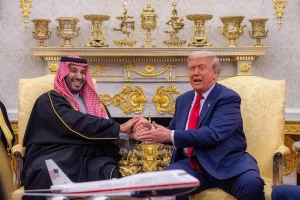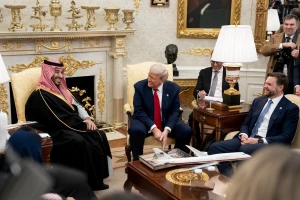Trump said to be ‘disappointed’ with MBS after he rejects Saudi-Israel normalization in White House meeting
MSB cites 'widespread anti-Israel sentiment' as reason preventing peace

U.S. President Donald Trump was taken aback after Saudi Crown Prince Mohammed bin Salman rejected the normalization of relations with Israel in a “tense” meeting at the White House last week, Israel’s Channel 12 News and Axios reported.
Both outlets cited two U.S. officials and another informed source, who said Trump was left “disappointed and angry” after raising the issue of Saudi Arabia joining the Abraham Accords.
Mohammed bin Salman (MBS) had been informed by a U.S. official ahead of the discussion that Trump expects progress on normalization, which has been in the works since the Abraham Accords were signed in 2020, during the U.S. president's first term.
However, MBS reportedly argued that he isn’t opposed to making peace with Israel but that the widespread anti-Israel sentiment among the Saudi public would not allow such a significant step at this time.
Despite the “tense” meeting, the conversation stayed polite and the two leaders gave no indication of differences of opinion after the meeting.
U.S. officials told Axios that Trump “pressed hard” for MBS to join the accords but that the Saudi leader pushed back, insisting that it wasn’t a good time for him to advance an ostensibly unpopular peace deal.
“The best way to say it is disappointment and irritation. The president really wants them to join the Abraham Accords. He tried very hard to talk him. It was an honest discussion. But MBS is a strong man. He stood his ground,” the source said.
MBS reportedly reiterated his insistence on an “irreversible, credible and time-bound path” for a Palestinian state as a condition for peace, which he stated in public after the meeting.
Israeli Prime Minister Benjamin Netanyahu has ruled out this possibility for now but agreed to a U.S.-backed UN resolution stating that once the PA completes reforms and Gaza’s reconstruction progresses, “conditions may finally be in place for a credible pathway to Palestinian self-determination and statehood.”
“MBS never said no to normalization. The door is open for doing it later. But the two-state solution is an issue,” a White House official told Axios.
“Now that Iran's nuclear program has been totally obliterated and the war in Gaza has ended, it is very important to President Trump that all Middle Eastern countries join the Abraham Accords, which will advance peace in the region,” the source added.
However, some experts have argued that the Iranian nuclear threat was the main motivating factor for Saudi Arabia to seek a security alliance with Israel and the U.S., making peace less likely now that the regime’s nuclear program has been set back by years.
According to a poll by the Jerusalem Center for Security and Foreign Affairs published last week, 70% of Israelis oppose the establishment of a Palestinian state in the 1967 borders, meaning in Judea and Samaria.
Sixty-two percent of respondents said they oppose establishing a Palestinian state in exchange for normalization with Saudi Arabia.
In addition, 40% of Israelis said they support normalization if the Saudi Kingdom receives F-35 aircraft in exchange for dropping the demand for a Palestinian state. However, 34% of all respondents said such a deal should be contingent on a U.S. commitment to maintaining Israel’s qualitative military edge.

The All Israel News Staff is a team of journalists in Israel.
You might also like to read this:











